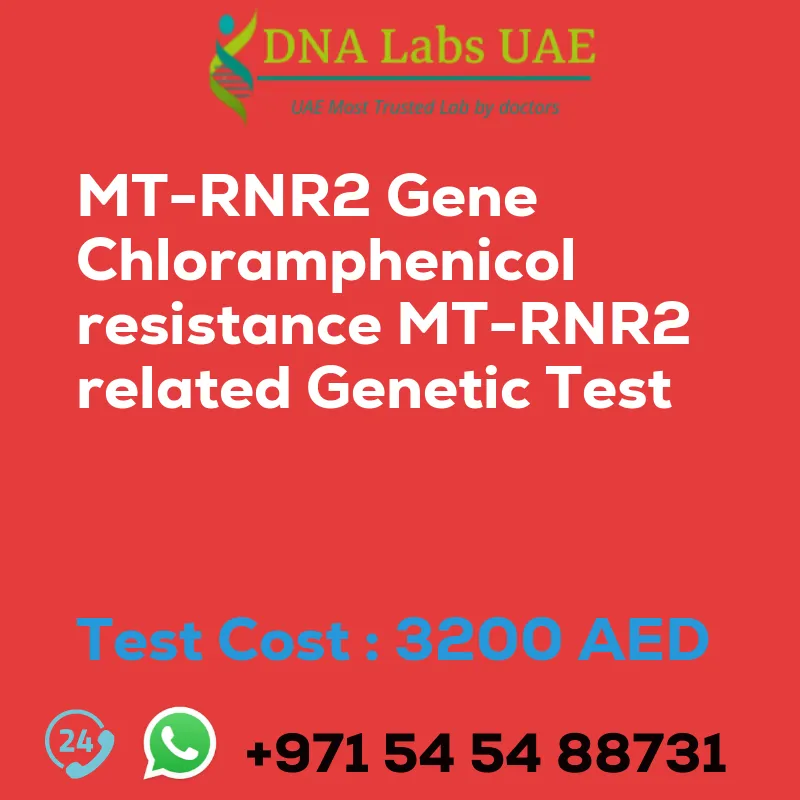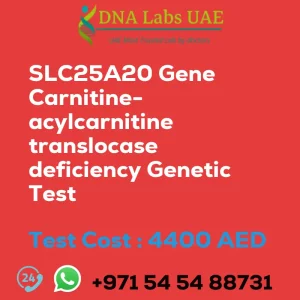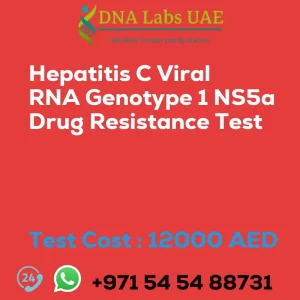MT-RNR2 Gene Chloramphenicol resistance MT-RNR2 related Genetic Test
Welcome to DNA Labs UAE, a leading genetic laboratory specializing in genetic testing. In this blog post, we will discuss the MT-RNR2 gene and its association with chloramphenicol resistance.
Test Details
The MT-RNR2 gene is responsible for encoding a mitochondrial RNA molecule that is essential for the production of proteins in mitochondria. Mutations in this gene have been associated with resistance to the antibiotic chloramphenicol.
NGS (Next-Generation Sequencing) genetic testing is a method used to analyze the DNA or RNA of an individual to identify genetic variations or mutations. In the context of MT-RNR2, NGS genetic testing can be used to identify any mutations or variations in this gene that may confer resistance to chloramphenicol.
This type of genetic testing can be useful in clinical settings to guide treatment decisions, particularly when chloramphenicol is being considered as an antibiotic. By identifying individuals who have mutations in the MT-RNR2 gene associated with chloramphenicol resistance, healthcare providers can choose alternative antibiotics that are more effective for those individuals.
It is important to note that NGS genetic testing is a complex process that requires specialized equipment and expertise. The results of such testing should be interpreted by healthcare professionals who are knowledgeable in genetics and can provide appropriate guidance and recommendations based on the individual’s genetic profile.
Test Name: MT-RNR2 Gene Chloramphenicol resistance MT-RNR2 related Genetic Test
Components:
- Price: 3200.0 AED
- Sample Condition: Blood or Extracted DNA or One drop Blood on FTA Card
- Report Delivery: 3 to 4 Weeks
- Method: NGS Technology
- Test Type: Metabolic Disorders
- Doctor: General Physician
- Test Department: Genetics
Pre Test Information
Prior to undergoing the MT-RNR2 Gene Chloramphenicol resistance test, it is important to provide the clinical history of the patient. Additionally, a genetic counseling session will be conducted to draw a pedigree chart of family members affected with Chloramphenicol resistance and MT-RNR2 related conditions.
This pre-test information is crucial in understanding the patient’s genetic background and determining the appropriate course of action.
Conclusion
In conclusion, the MT-RNR2 gene is associated with chloramphenicol resistance. NGS genetic testing can be used to identify mutations or variations in this gene, allowing healthcare providers to make informed decisions regarding antibiotic treatment. DNA Labs UAE offers the MT-RNR2 Gene Chloramphenicol resistance test at a cost of 3200.0 AED. It is recommended to consult with a general physician and genetic counselor for proper interpretation and guidance based on the individual’s genetic profile.
| Test Name | MT-RNR2 Gene Chloramphenicol resistance MT-RNR2 related Genetic Test |
|---|---|
| Components | |
| Price | 3200.0 AED |
| Sample Condition | Blood or Extracted DNA or One drop Blood on FTA Card |
| Report Delivery | 3 to 4 Weeks |
| Method | NGS Technology |
| Test type | Metabolic Disorders |
| Doctor | General Physician |
| Test Department: | Genetics |
| Pre Test Information | Clinical History of Patient who is going for MT-RNR2 Gene Chloramphenicol resistance, MT-RNR2 related NGS Genetic DNA Test A Genetic Counselling session to draw a pedigree chart of family members affected with Chloramphenicol resistance, MT-RNR2 related |
| Test Details |
The MT-RNR2 gene is responsible for encoding a mitochondrial RNA (ribonucleic acid) molecule that is essential for the production of proteins in mitochondria. Mutations in this gene have been associated with resistance to the antibiotic chloramphenicol. NGS (Next-Generation Sequencing) genetic testing is a method used to analyze the DNA or RNA of an individual to identify genetic variations or mutations. In the context of MT-RNR2, NGS genetic testing can be used to identify any mutations or variations in this gene that may confer resistance to chloramphenicol. This type of genetic testing can be useful in clinical settings to guide treatment decisions, particularly when chloramphenicol is being considered as an antibiotic. By identifying individuals who have mutations in the MT-RNR2 gene associated with chloramphenicol resistance, healthcare providers can choose alternative antibiotics that are more effective for those individuals. It is important to note that NGS genetic testing is a complex process that requires specialized equipment and expertise. The results of such testing should be interpreted by healthcare professionals who are knowledgeable in genetics and can provide appropriate guidance and recommendations based on the individual’s genetic profile. |








